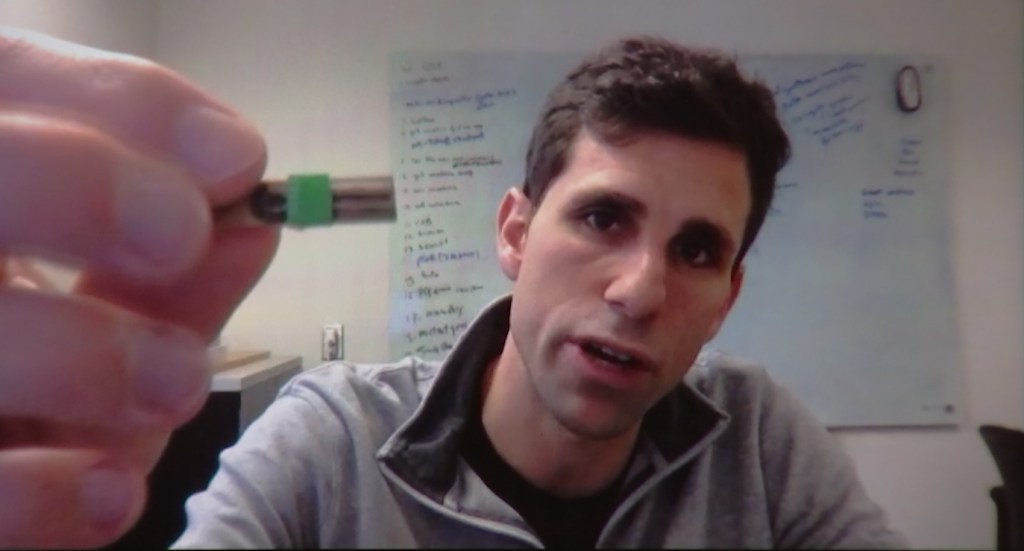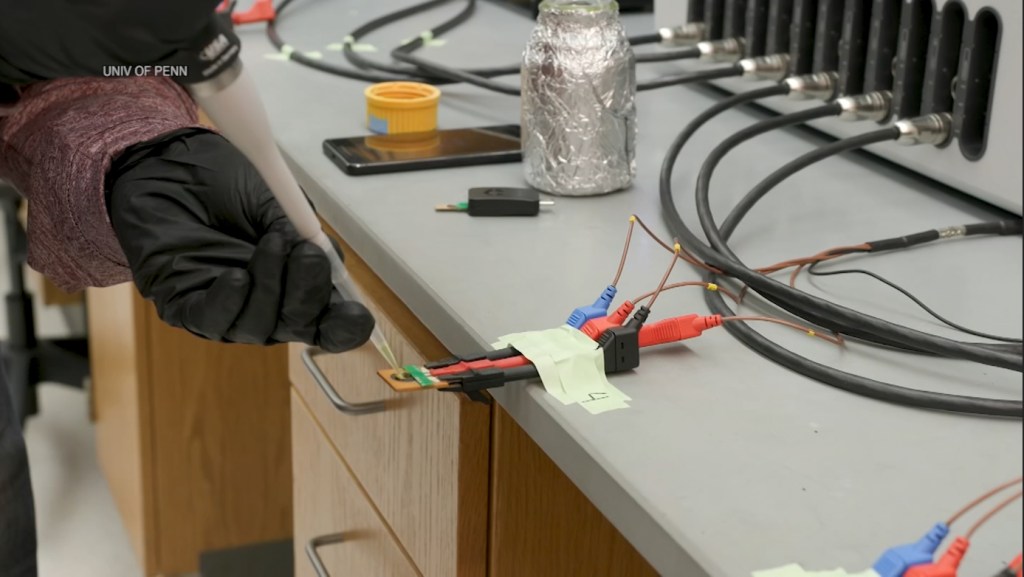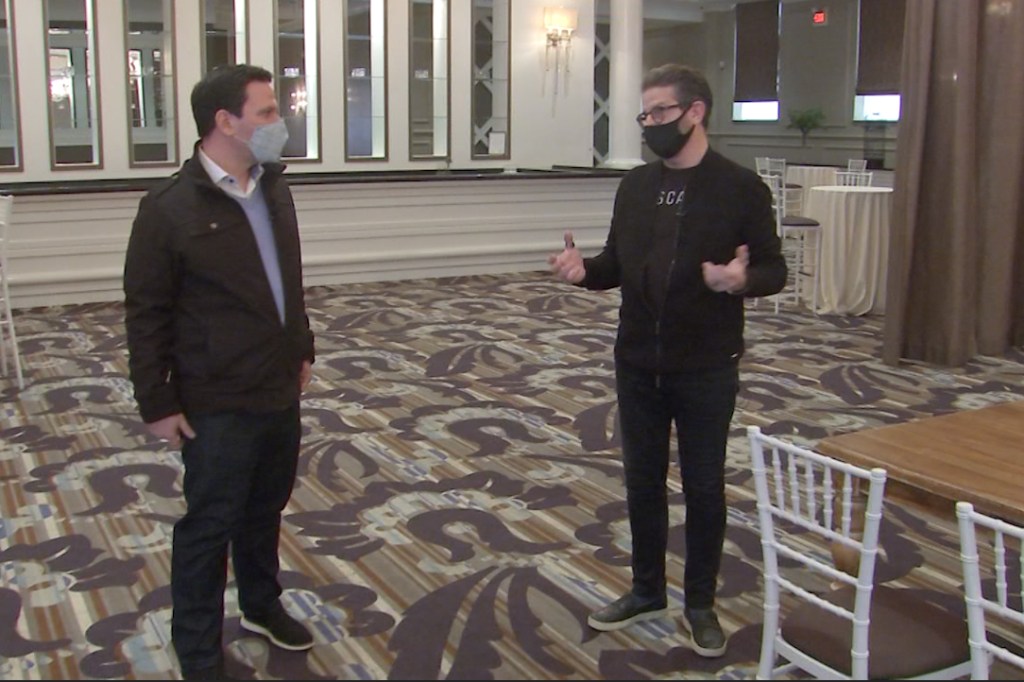When the coronavirus pandemic struck last year, a small team at the University of Pennsylvania already was working on a quick way to diagnosis bacterial infections.
During the initial stretch of the outbreak, the team at Penn called the "Machine Biology Group" pivoted its research to detect Sars-CoV-2 particles in saliva samples.
“We focused on generating a technology that is very low cost and accessible to as many people as possible,” team lab leader César de la Fuente said.
De La Fuente's lab has developed the rapid, at-home Covid-19 test called DETECT. To conduct a test you needs a smart phone with the DETECT app, an adapter to read the sample, and what De La Fuente calls a "chip" where a saliva sample is collected.

De La Fuente shows one of the biodegradable sample collection ‘chips’ his team developed.
“It all works through these chips that we’ve generated. They’re very small. You can make them out of different materials: paper, cardboard,” he said. “You can put your saliva sample onto the chip and you can connect it to this little machine, and then you connect it to your phone.”
DETECT’s initial clinical trial began on January 5, 2021. Four hundred samples from volunteers were collected and tested, according to results published by De La Fuente but not yet peer reviewed. Two hundred samples contained Sars-CoV-2 particles, while the other 200 did not. They were previously verified by the reliable and FDA authorized polymerase chain reaction test, commonly known as a PCR test.
According to De La Fuente, DETECT was 94% accurate during the trial. Each test took less than five minutes to preform, while the materials to run the test cost $4.

Inside UPenn’s Machine Biology lab as DETECT is first tested for accuracy.
Part of President Joe Biden’s COVID-19 relief plan includes $50 billion to scale testing.
But multiple doctors and scientists still warn that rapid tests have a blind spot.
"This sort of blind acceptance of a machine telling you yes or no could lead you to a lot of these false positives," Dr. David Harris of the University of Arizona said.
Harris, who uses both rapid and laboratory COVID tests to find infections and stop them from spreading on Arizona’s campus, said they've performed about 200,000 tests so far.
He hasn’t used DETECT or studied its results, but said the rapid tests he has used and studied aren’t sensitive enough to see low infection levels. That makes them less likely to spot someone without symptoms.
"The guy who’s way above, who’s actively infected and sick, it's easy to tell them apart from the guy who’s healthy," Harris said "It’s the guy who’s near the threshold who might be on the edge of becoming sick that you can’t tell. So we look at the raw data instead of having a machine say 'yay' or 'nay.'"
In Philadelphia, hospitality leaders have been talking about using testing to create COVID-free zones since the first test was authorized last March.
"That was going to be our silver bullet," wedding and event coordinator Joe Volpe said.
But testing speed and cost proved to be tough barriers.
“Obviously we’re very much aware of the potential impact this could have on people and our main goal here is to try and help people,” De La Fuente said. “This setup is more for home test setup, more for individualized use.”
De La Fuente said DETECT may present rapid, reliable testing solutions for the pandemic’s hardest hit businesses. Bureau of Labor and Industry records show no industry in the Philadelphia metropolitan area has been harder hit than the leisure and hospitality industry.
According to BLS records, between June 2019 and June 2020 more than half of Philadelphia’s hospitality jobs evaporated.

Before Covid-19, Philadelphia wedding coordinator Joe Volpe planned up to 18 weddings a weekend.
“We’re at a 90% loss in revenue,” Volpe said.
Volpe manages six venues in Philadelphia. He said before the pandemic, he would often book as many as 18 weddings a weekend.
“We all do believe that the future is bright because we know there’s a pent up demand for what we do,” Volpe said.
Volpe said a rapid and inexpensive Covid-19 test could be a way to weed out asymptomatic cases before they reach his ballrooms. He also said he wouldn’t want to break bad news to couple on their wedding day.
“What if your future mother in law tests positive that day? What if your best man tests positive? How do you handle that?" Volpe asked.
He said DETECT might be best suited for bars or restaurants where each party can more easily be tested and separated if necessary.
The Food and Drug Administration has authorized 322 Covid-19 tests since March 2020. To date, only one of those tests allows someone to test themselves and get the results in under an hour without a prescription or lab.
According to test results filed with and approved by the FDA, Australian company Ellume makes a home test that provides a 96% accurate result in 30 minutes. It costs $30.00.
De La Fuente said he hopes to submit DETECT to the FDA for approval in March.
"Give" - Google News
February 19, 2021 at 11:52AM
https://ift.tt/3bdMHqo
Rapid COVID-19 Test Developed at Penn Could Give On-the-Spot Results Quickly - NBC 10 Philadelphia
"Give" - Google News
https://ift.tt/2YqGX80
https://ift.tt/2YquBwx
Bagikan Berita Ini














0 Response to "Rapid COVID-19 Test Developed at Penn Could Give On-the-Spot Results Quickly - NBC 10 Philadelphia"
Post a Comment